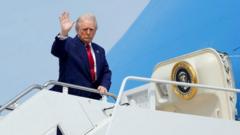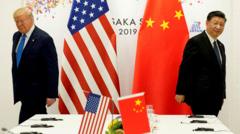As Australia grapples with the implications of the Trump administration’s treatment of allies, particularly following recent tariffs on Australian exports, discussions arise around the need for a “Plan B” in national defense, questioning the reliability of America's commitment.
Australia Reassesses Its Defense Alliance with the U.S. Amid Changing Political Dynamics

Australia Reassesses Its Defense Alliance with the U.S. Amid Changing Political Dynamics
With growing concerns over U.S. foreign policy under Trump, Australia considers alternatives to its historically close defense relationship with America.
Australia, traditionally viewed as one of America's steadfast allies, is currently reassessing the strength and reliability of its defense relationship with the United States. This introspection comes in light of former President Trump’s unpredictable foreign policy and his contentious dealings with other longstanding partners like Canada and European nations, which have left Australian leaders uneasy about their own position.
Historically, Australia has pursued a close military partnership with the U.S., participating alongside American forces in all major conflicts since World War I. Jake Sullivan, ex-national security adviser under President Biden, previously described the alliance as a “strategic marriage.” However, recent developments have prompted many Australians to reflect on their alliance, likening it to waking up to find a stranger in their bed.
This week’s enforcement of a 10 percent tariff on Australian exports to the U.S., coupled with a significant 25 percent tariff on both steel and aluminum, is stirring discontent. Australian Prime Minister Anthony Albanese noted that these actions could profoundly affect public perception of the U.S. relationship. Malcolm Turnbull, a former prime minister, echoed these concerns, stating, “We are dealing with an America whose values no longer align with ours."
The calls for a "Plan B" stem from the growing uncertainties introduced by a shifting global power dynamic, particularly as China's military prowess continues to rise in the region. Australia, a vast nation of 27 million spanning a landmass similar to the continental U.S., has always relied upon strong defensive partnerships—first with Britain and later, primarily with the U.S. The current geopolitical climate prompts questions about Australia's military strategy and alliances as it seeks to ensure effective security in an increasingly complex landscape.






















